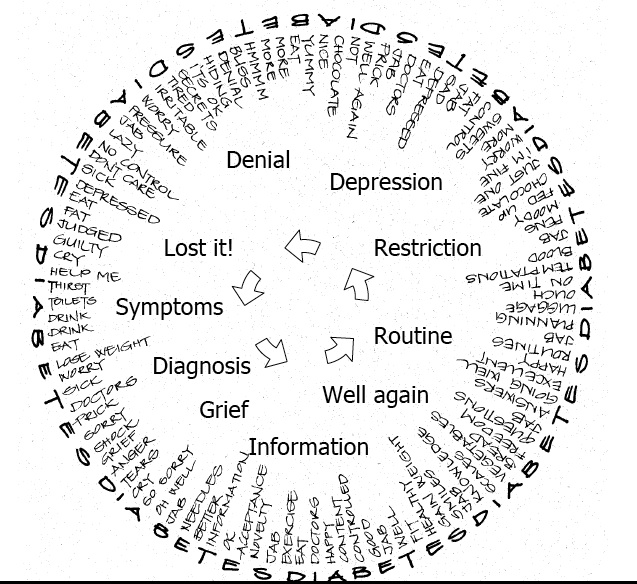|
Diabetes and Emotions
How does Diabetes affect our emotions? How do our emotions affect Diabetes?

A
A person’s emotional needs and problems are an important component of overall health and an integral component of Diabetes management. Physical health and mental health are interrelated, and each affects the other. It’s undoubtedly more difficult to comply with your Diabetes treatment plan when you feel physically and emotionally distressed. Counseling and education can improve the relationship between Diabetes and life. And, if Diabetics, their families and friends all know what to expect, difficult days and blood sugar related mood swings can be managed successfully.
We have all experienced the symptoms of sluggishness and fatigue (i.e. high blood sugars), which affect our Diabetes maintenance, as do regular exercise or taking medications, both of which are important for minimizing our risks of Diabetes-related complications and for improving our mental health. Emotional stress due to Diabetes can be detrimental. For example, any type of stress (even just making it through the holiday season) can suppress the body’s immune function and increase the likelihood of getting sick- mostly due to the increase in cortisol levels. Furthermore, emotional stress leads to the secretion of many hormones that can counteract the actions of insulin and disrupt blood sugar control. These stress-induced emotions often lead to both low (irritability) or high (unmotivated) blood sugar levels, which may disrupt our emotional states, relationships, eating habits, exercise and daily routines.
Stress levels are compounded day after day just by living with diabetes; when emotional stress is thrown into the mix, it becomes important that we, as diabetics, learn to cope with our stress levels and eliminate any further negative impact on our physical and mental health.
Common Psychological Issues for Persons with Type 1 and Type 2 Diabetes
Difficulty following treatment recommendations:
For example, committing to regular diet and exercise, insulin management (keeping sugar/insulin/food logs), giving injections and treating insulin shock.
Relationships with families, friends and professionals:
People with diabetes often respond emotionally to their hormone levels, and may experience strong mood swings. A person with diabetes may suddenly express long-withheld emotions, at times feverishly. Sometimes, diabetics may be unaware of severe mood swings; and then act as if their current emotions/feelings will not affect long-term decisions. Furthermore, emotional outbursts may follow minor events. Often, low blood sugar results in a temporary personality change of belligerence or extreme irritability.
A person with diabetes may criticize or announce an unusual decision to family members, friends or colleagues ... and then quickly forget these conversations. Family members, friends and business associates affected by such hasty decisions may respond with their own emotions. Eventually, they stop trusting the diabetic person or begin monitoring the diabetic person more closely than is healthy for either the diabetic or family member/friend/associate. As they happen, emotional conflicts can spiral to create relationship turmoil.
Depression
There have been several studies that suggest people with diabetes are more likely to suffer from depression. Depression is an illness affecting both your mind and your body. When in a depressed state, you may feel sad, lethargic, apathetic toward your self-care, or downright uninterested in everything. Obviously, you can see that it is very difficult to manage your diabetes and stay healthy when you’re depressed.
Depression is often a response to an unhealthy environment or relationship. Guilt often underlies depression. If a person feels guilty for having hurt people, (i.e. feeling like a burden to family/friends due to diabetes and its symptoms), then life may not make sense, which leads to depression. At times, depression results from stress, which influences healthy management of diabetes. Daily injections, mood swings and fears of complications may also become a source of depression, frustration, anxiety and apathy. Often, diabetics have difficulty managing stressful emotions, such as guilt, anger, fear, sadness, and thoughts about cause,seriousness, and treatment effectiveness.
Guilt
Guilt is often a conflict about having hurt other people; i.e. having a low blood sugar outburst towards family, friends or colleagues.
Anger
Anger is often related to violated personal values, i.e. feeling angry that your friends/family are eating sugary foods in front of you and being insensitive, or that they are withholding sugary foods from their diets to avoid hurting you.
Anxiety
Anxiety is often a reaction to possible future events; i.e fear about complications one may face from diabetes at an older age.
Contact Denver Diabetes Counseling today to start exploring your emotions...
To learn more about what to expect in therapy, visit our About Therapy page.
Contact Denver Diabetes Counseling Today...
Phone: 720-420-6541
Email: jenna@denverdiabetescounseling.com
|
 |



